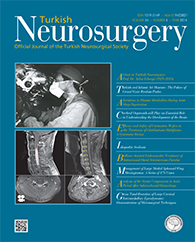MATERIAL and METHODS: Four patients that received cerebral aneurysm clipping were included in the study. Papaverine (3%, 60 mg) was dropped into the internal carotid artery cistern to relieve vascular spasm and act on the oculomotor nerve intentionally at the same time. The size, shape and reflection of light of the bilateral pupils were monitored at different times after application of papaverine and every 30 min after surgery continuously for 4 hours.
RESULTS: Prior to the application of papaverine, the bilateral pupils in 4 patients were the same in size and shape. Two to 5 minutes after the application of papaverine, the ipsilateral pupils of the surgical site were dilated in all four patients and the contralateral pupil showed dilation in 1 patient, and recovered to a normal size at 2–5 hours after the application of papaverine. Papaverine reduced light reflection of the ipsilateral pupil of the surgery site; Papaverine changed the ipsilateral pupil of the surgery site to an irregular elliptical shape, which lasted for different times. Four patients regained consciousness normally without demonstration of nerve damage.
CONCLUSION: Our results confirmed previous reports that local application of papaverine in the carotid artery pool during artery aneurysm surgery resulted in dilation of the ipsilateral pupil of the surgery site. In addition, our results indicated that the pupil changes induced by papaverine occurred within several minutes after the application of papaverine.
Keywords : Papaverine, Pupil, Aneurysm, Oculomotor nerve




